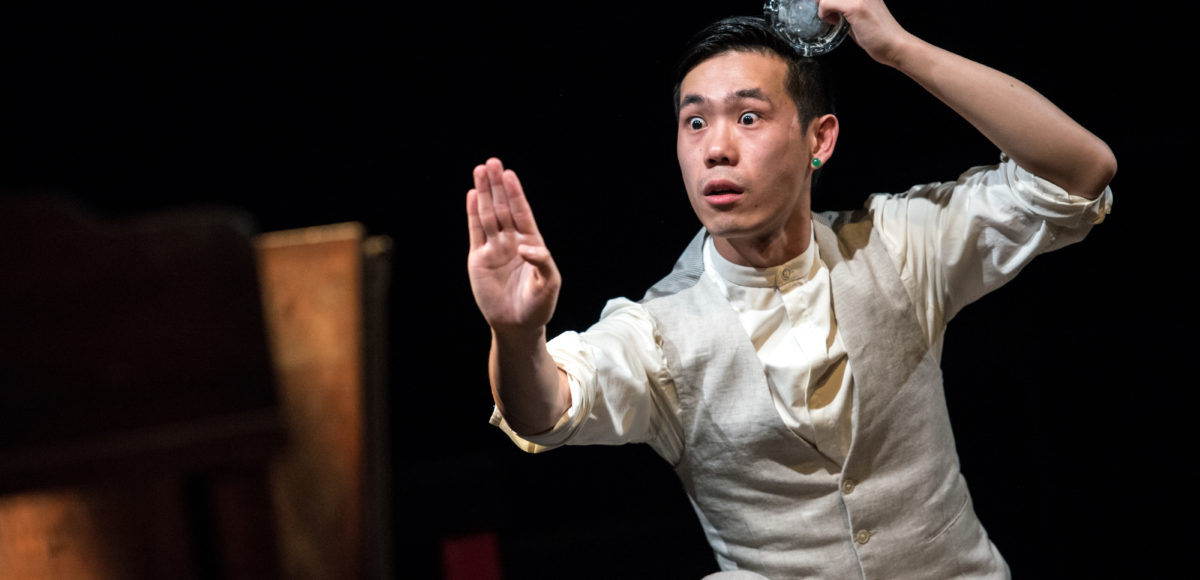Had Jeff Ho not run away to Montreal when he was a teenager, his mother might never have understood what theatre is all about.
The Hong Kong-born Ho, whom you may remember as a lithe and vulnerable Ophelia in Ravi Jain’s memorable Prince Hamlet at the National Arts Centre last season, is back at the NAC in a few days performing in his solo show trace which is also Ho’s playwriting debut.
Written in the form of a sonata with the classically trained Ho playing two pianos, the play traces the real-life stories of three generations of strong women in his family, from his great-grandmother’s escape to Hong Kong from China during the Second World War to his mother’s emigration from Hong Kong to Toronto looking for a better life as a single parent with two boys in tow.
Thing is, Ho’s mom, understandably concerned about her sons’ future security, didn’t envision Jeff doing all this artsy stuff, even if she had held down three jobs, in part to pay for his piano lessons. A comfy gig as a corporate CEO was her dream for him.
Hooked on theatre in high school, he had other dreams, including formal studies in Montreal. Ho and his mother butted heads over the issue, so, in 2008, he did what any sensible 16-year-old would do: “I got a midnight bus ticket to Montreal, got there for 5 a.m., had to figure out the Metro system in the morning,” he says.
With his eye on a berth in Concordia University’s long-running theatre program, he ignored normal admission procedures and simply showed up on audition day with the requisite $60 fee in his pocket and begged for a slot. He got it, was admitted and, after two years, shifted to the National Theatre School.
Jobs like serving at Ben & Jerry’s ice cream parlour, stints teaching kids piano, a cheap apartment and NTS’s generous scholarships kept the aspiring actor afloat.
While at NTS, he began working on the story that eventually became trace, which debuted in 2017.
Creating the play was, he explains, in part an attempt to understand his mother’s resistance to his desire for an artist’s life. That, in turn, led him to develop the characters of his grandmother and the family’s matriarch: his tobacco- and mahjong-addicted great-grandmother.
That involved interviewing his mother and grandmother. It took coaxing to convince them, but, as it turned out, “it was a real moment of healing with my family. They still didn’t quite get what I was doing, but at the same they were understanding that there’s a story to be told.
“I think that’s what changed my mother’s mind. I think for a long time in Canada, she thought, ‘Oh, that’s not for us: Shakespeare, these plays — I don’t have any interest in them or see myself in them.’ (But that eventually became) ‘Oh, ok, I guess theatre is simply storytelling,’ and with that change, she started understanding it better.”
So much so that his mother developed a love of storytelling herself and, when Ho brought his partner along for the interviews, she took on the characters she was talking about.
Working on the play was also personally illuminating for Ho.
“Growing up as a queer Asian boy, there was a lot fighting the gender binary, what was expected of me,” he says. “In Cantonese culture there’s a lot of sayings like, ‘You can bleed but not cry as a man.’ … So to learn the gender that I am but also recognize the femininity in my body, being able to embody these women in my family, has taught me that a lot of the strength and stubbornness of my mother is inherent in me. It taught me a lot about who I am and how I became the way I am.”
The tension that had long characterized Ho’s relationship with his mother hasn’t vanished, of course. Such things rarely do. He says she thinks she’s portrayed as a bit of a villain in the play, but he counters that he’s depicted her factually and that she doesn’t want to recognize just how difficult she was.
In the end, he says the play, which includes some of his mother’s favourite music, is “a love letter to her, just without any of the sentiment and with all the grit left intact. She’s excited. I believe she’s coming to Ottawa to see it at the NAC.”
Trace is in the Azrieli Studio Nov. 12-23 (previews, Nov. 12 & 13; opening night, Nov. 14). For tickets and more information: NAC box office, Ticketmaster outlets, 1-888-991-2787, nac-cna.ca







